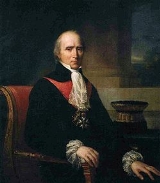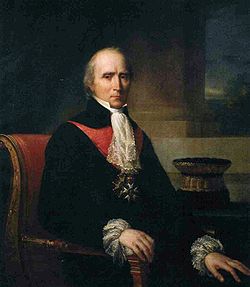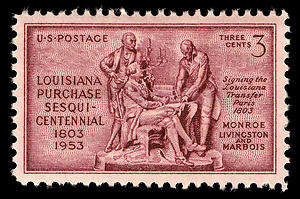
François Barbé-Marbois
Encyclopedia

Marquess
A marquess or marquis is a nobleman of hereditary rank in various European peerages and in those of some of their former colonies. The term is also used to translate equivalent oriental styles, as in imperial China, Japan, and Vietnam...
de Barbé-Marbois (31 January 1745 – 12 February 1837) was a French
France
The French Republic , The French Republic , The French Republic , (commonly known as France , is a unitary semi-presidential republic in Western Europe with several overseas territories and islands located on other continents and in the Indian, Pacific, and Atlantic oceans. Metropolitan France...
politician.
Early career
Born in MetzMetz
Metz is a city in the northeast of France located at the confluence of the Moselle and the Seille rivers.Metz is the capital of the Lorraine region and prefecture of the Moselle department. Located near the tripoint along the junction of France, Germany, and Luxembourg, Metz forms a central place...
, where his father was director of the local mint, Barbé-Marbois tutored the children of the Marquis de Castries
Charles Eugène Gabriel de La Croix, marquis de Castries
Charles Eugène Gabriel de La Croix de Castries, marquis de Castries, baron des États de Languedoc, comte de Charlus, baron de Castelnau et de Montjouvent, seigneur de Puylaurens et de Lézignan was a French marshal...
. In 1779 he was made secretary of the French legation to the United States
United States
The United States of America is a federal constitutional republic comprising fifty states and a federal district...
. He was elected a Foreign Honorary Member of the American Academy of Arts and Sciences
American Academy of Arts and Sciences
The American Academy of Arts and Sciences is an independent policy research center that conducts multidisciplinary studies of complex and emerging problems. The Academy’s elected members are leaders in the academic disciplines, the arts, business, and public affairs.James Bowdoin, John Adams, and...
in 1781. When the minister Chevalier de la Luzerne returned to France in 1783, Barbé-Marbois remained in America as chargé d'affaires. That year he married Elizabeth Moore, the daughter of William Moore
William Moore (statesman)
William Moore was a Pennsylvania statesman and politician of the Revolutionary era. He served as Vice-President of Pennsylvania from 1779 to 1781, and then as President from 1781 to 1782....
, former governor of Pennsylvania
Pennsylvania
The Commonwealth of Pennsylvania is a U.S. state that is located in the Northeastern and Mid-Atlantic regions of the United States. The state borders Delaware and Maryland to the south, West Virginia to the southwest, Ohio to the west, New York and Ontario, Canada, to the north, and New Jersey to...
.
In 1785 he became intendant
Intendant
The title of intendant has been used in several countries through history. Traditionally, it refers to the holder of a public administrative office...
of the colony
French colonial empires
The French colonial empire was the set of territories outside Europe that were under French rule primarily from the 17th century to the late 1960s. In the 19th and 20th centuries, the colonial empire of France was the second-largest in the world behind the British Empire. The French colonial empire...
of Saint-Domingue
Saint-Domingue
The labour for these plantations was provided by an estimated 790,000 African slaves . Between 1764 and 1771, the average annual importation of slaves varied between 10,000-15,000; by 1786 it was about 28,000, and from 1787 onward, the colony received more than 40,000 slaves a year...
under the Ancien Régime.
In the Revolution
At the close of 1789, he returned to France, and then placed his services at the disposal of the French RevolutionFrench Revolution
The French Revolution , sometimes distinguished as the 'Great French Revolution' , was a period of radical social and political upheaval in France and Europe. The absolute monarchy that had ruled France for centuries collapsed in three years...
ary government. In 1791 he was sent to Regensburg
Regensburg
Regensburg is a city in Bavaria, Germany, located at the confluence of the Danube and Regen rivers, at the northernmost bend in the Danube. To the east lies the Bavarian Forest. Regensburg is the capital of the Bavarian administrative region Upper Palatinate...
to help the Marquis de Noailles, the French ambassador. Suspected of treason
Treason
In law, treason is the crime that covers some of the more extreme acts against one's sovereign or nation. Historically, treason also covered the murder of specific social superiors, such as the murder of a husband by his wife. Treason against the king was known as high treason and treason against a...
, he was arrested on his return but soon freed.
In 1795 he was elected to the Council of the Ancients, where the general moderation
Moderate
In politics and religion, a moderate is an individual who is not extreme, partisan or radical. In recent years, political moderates has gained traction as a buzzword....
of his attitude, especially in his opposition to the exclusion of nobles
French nobility
The French nobility was the privileged order of France in the Middle Ages and the Early Modern periods.In the political system of the Estates General, the nobility made up the Second Estate...
and the relations of émigré
Émigré
Émigré is a French term that literally refers to a person who has "migrated out", but often carries a connotation of politico-social self-exile....
s from public life, brought him under suspicion of being a royalist, though he pronounced a eulogy
Eulogy
A eulogy is a speech or writing in praise of a person or thing, especially one recently deceased or retired. Eulogies may be given as part of funeral services. However, some denominations either discourage or do not permit eulogies at services to maintain respect for traditions...
on Napoleon Bonaparte for his success in Italy
French Revolutionary Wars: Campaigns of 1797
The French Revolutionary Wars continued from 1796, with France fighting the First Coalition.On 14 February, British admiral Jervis met and defeated a Spanish fleet off Portugal at the Battle of Cape St. Vincent. This prevented the Spanish fleet from rendezvousing with the French, removing a threat...
.
At the Royalist
House of Bourbon
The House of Bourbon is a European royal house, a branch of the Capetian dynasty . Bourbon kings first ruled Navarre and France in the 16th century. By the 18th century, members of the Bourbon dynasty also held thrones in Spain, Naples, Sicily, and Parma...
coup d'état
Coup d'état
A coup d'état state, literally: strike/blow of state)—also known as a coup, putsch, and overthrow—is the sudden, extrajudicial deposition of a government, usually by a small group of the existing state establishment—typically the military—to replace the deposed government with another body; either...
of the 18th Fructidor (4 September) 1797), he was arrested and transported to French Guiana
French Guiana
French Guiana is an overseas region of France, consisting of a single overseas department located on the northern Atlantic coast of South America. It has borders with two nations, Brazil to the east and south, and Suriname to the west...
. Transferred to the island of Oléron
Oléron
Île d'Oléron is an island off the Atlantic coast of France , on the southern side of the Pertuis d'Antioche strait....
in 1799, he was set free by Napoleon Bonaparte
Napoleon I of France
Napoleon Bonaparte was a French military and political leader during the latter stages of the French Revolution.As Napoleon I, he was Emperor of the French from 1804 to 1815...
after the 18 Brumaire Coup
18 Brumaire
The coup of 18 Brumaire was the coup d'état by which General Napoleon Bonaparte overthrew the French Directory, replacing it with the French Consulate...
. In 1801, under the Consulate
French Consulate
The Consulate was the government of France between the fall of the Directory in the coup of 18 Brumaire in 1799 until the start of the Napoleonic Empire in 1804...
, he became councillor of state and director of the Trésor public
Trésor public
The Trésor public is the national administration of the Treasury in France. It is headed by the general direction of public accountancy in the Ministry of the Economy, Finance and Industry....
(Treasury), and in 1802 a senator.

Louisiana Purchase
The Louisiana Purchase was the acquisition by the United States of America of of France's claim to the territory of Louisiana in 1803. The U.S...
treaty by which Louisiana
Louisiana
Louisiana is a state located in the southern region of the United States of America. Its capital is Baton Rouge and largest city is New Orleans. Louisiana is the only state in the U.S. with political subdivisions termed parishes, which are local governments equivalent to counties...
was ceded to the United States
United States
The United States of America is a federal constitutional republic comprising fifty states and a federal district...
, and was rewarded by the First Consul with a gift of 152,000 francs
French franc
The franc was a currency of France. Along with the Spanish peseta, it was also a de facto currency used in Andorra . Between 1360 and 1641, it was the name of coins worth 1 livre tournois and it remained in common parlance as a term for this amount of money...
.
Empire, Restoration, and July Monarchy
Loyal to the First EmpireFirst French Empire
The First French Empire , also known as the Greater French Empire or Napoleonic Empire, was the empire of Napoleon I of France...
, he was made grand officer of the Legion of Honour and a count
Count
A count or countess is an aristocratic nobleman in European countries. The word count came into English from the French comte, itself from Latin comes—in its accusative comitem—meaning "companion", and later "companion of the emperor, delegate of the emperor". The adjective form of the word is...
in 1805, and in 1808 he became president of the Cour des Comptes
Cour des Comptes
The Court of Audit is a quasi-judicial body of the French government charged with conducting financial and legislative audits of most public institutions and some private institutions, including the central Government, national public corporations, social security agencies , and public services...
. His career as Head of the Treasury ended in 1806. In return for these favours, he heaped praise upon Napoleon; yet, in 1814, he helped to draw up the act of abdication of the emperor, and declared to the Cour des Comptes, with reference to the invasion of France by the Sixth Coalition:
- "...united for the most beautiful of causes, it is long since we have been as free as we are now, in the presence of the foreigner in arms."
In June of that year, under the First Restoration
First Restoration
The First Restoration, or Première Restauration in French, refers to Louis XVIII of France's accession to the throne after Napoleon's exile to Elba. It lasted from 6 April 1814 to 20 March 1815, on which day Napoleon arrived back in Paris....
, Barbé-Marbois was made Peer of France
Peerage of France
The Peerage of France was a distinction within the French nobility which appeared in the Middle Ages. It was abolished in 1789 during the French Revolution, but it reappeared in 1814 at the time of the Bourbon Restoration which followed the fall of the First French Empire...
by King Louis XVIII
Louis XVIII of France
Louis XVIII , known as "the Unavoidable", was King of France and of Navarre from 1814 to 1824, omitting the Hundred Days in 1815...
, and confirmed in his office as president of the Cour des Comptes. Deprived of his positions by Napoleon during the Hundred Days
Hundred Days
The Hundred Days, sometimes known as the Hundred Days of Napoleon or Napoleon's Hundred Days for specificity, marked the period between Emperor Napoleon I of France's return from exile on Elba to Paris on 20 March 1815 and the second restoration of King Louis XVIII on 8 July 1815...
, he was appointed Minister of Justice under the Duc de Richelieu
Armand-Emmanuel du Plessis, Duc de Richelieu
Armand Emmanuel Sophie Septimanie de Vignerot du Plessis, 5th Duke of Richelieu was a prominent French statesman during the Bourbon Restoration...
(August 1815), tried unsuccessfully to gain the confidence of the Ultra-Royalist
Ultra-royalist
Ultra-Royalists or simply Ultras were a reactionary faction which sat in the French parliament from 1815 to 1830 under the Bourbon Restoration...
s, and withdrew at the end of nine months (10 May 1816).
In 1830, when the July Revolution
July Revolution
The French Revolution of 1830, also known as the July Revolution or in French, saw the overthrow of King Charles X of France, the French Bourbon monarch, and the ascent of his cousin Louis-Philippe, Duke of Orléans, who himself, after 18 precarious years on the throne, would in turn be overthrown...
brought Louis Philippe
Louis-Philippe of France
Louis Philippe I was King of the French from 1830 to 1848 in what was known as the July Monarchy. His father was a duke who supported the French Revolution but was nevertheless guillotined. Louis Philippe fled France as a young man and spent 21 years in exile, including considerable time in the...
and the Orléans Monarchy
July Monarchy
The July Monarchy , officially the Kingdom of France , was a period of liberal constitutional monarchy in France under King Louis-Philippe starting with the July Revolution of 1830 and ending with the Revolution of 1848...
, Barbé-Marbois went, as president of the Cour des Comptes, to compliment the new king, and was confirmed in his position. He held his office until April 1834.
Works
In 1829 he wrote the book Histoire de la Louisiane et la cession de cette colonie par la France aux Etats-Unis de l'Amérique septentrionale ; précédée d'un discours sur la constitution et le gouvernement des Etats-Unis ("History of Louisiana and of Its Cession to the United States of Northern America; Preceded by a Discourse on the Constitution and Government of the United States").He published various texts, including:
- Reflexions sur la colonie de Saint-Domingue ("Thought on the Colony of Saint-Domingue", 1794)
- De la Guyane, etc. ("On [French] Guiana", 1822)
- Journal d'un deporté non jugé ("Diary of a Non-Tried Deportee" , 2 vols., 1834)
Written in 1780, while secretary to the French Legation to the US Army: "D'Complot du Benedict Arnold & Sir Henri Clinton contre Eunas` States du America General George Washington" One of the first accounts of Arnold's treason, was not published until 1816.
Trivia
In 1780, Barbe-Marbois sent a questionnaire to the governors of all 13 former American colonies, seeking information about each state's geography, natural resources, history, and government. Thomas JeffersonThomas Jefferson
Thomas Jefferson was the principal author of the United States Declaration of Independence and the Statute of Virginia for Religious Freedom , the third President of the United States and founder of the University of Virginia...
, who had just finished his final term as Virginia's governor, responded to this query with a manuscript that later became his famous "Notes on the State of Virginia
Notes on the State of Virginia
Notes on the State of Virginia was a book written by Thomas Jefferson. He completed the first edition in 1781, and updated and enlarged the book in 1782 and 1783...
".
External links
- http://www.yale.edu/lawweb/avalon/diplomacy/france/louis2.htm
- Letter from George Washington
- Letter from Thomas Jefferson
- http://www.antebellumcovers.com/catalog104.htm
- Exhibits

